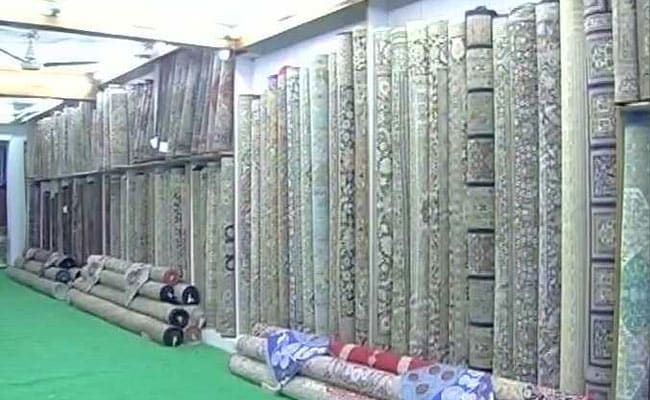Kashmir's carpet weavers say GST has hit their business hard and they are not getting customers
Srinagar:
Nazir Ahmad Dar's livelihood is literally hanging by a thread. The carpet-weaver who lives on the outskirts of Srinagar is under distress after the national sales tax GST was implemented in Kashmir valley. He had to shut over 20 looms. Out of 100 weavers working with him, 85 have already lost their job. Reason: the 50-year-old loom owner has not got a single order for the last three months. "100 weavers were working with me. Now, there are only 15. It's because after GST, not a single customer or order has come," Mr Dar said.
Carpet and other handicraft items had been tax free in Kashmir valley, but weavers will have to pay 12 per cent tax under the Goods and Services Tax. The national sales tax was implemented on July 1 this year.
Carpet traders say GST on handicraft is actually taxing labourers because 80 per cent of what goes as cost into making handmade carpets are actually months and sometimes years of hard work that weavers have put in.
On the banks of Dal Lake, Srinagar's largest carpet showroom is facing its worst slump. No one is coming to buy the exquisite carpets, once a craze for middle class families.
"Carpet or shawl is labour-intensive. 20 per cent is raw material and 80 per cent of carpet cost is wages of labourers because it takes a long time to make a carpet. It means you are imposing tax on labourers which is 80 per cent the cost of a carpet. It's unfair," said Vicky Shaw, owner of Shaw Art Palace.
Last year, carpet exports from Kashmir crossed Rs 1,100 crore.
 Carpet exporter Sheikh Ashique has not bought or exported even a single carpet for the last three months. He said the GST is killing the handicraft industry. "We fear in the coming times we may lose this cultural industry from Kashmir. It's a high-value product which is only made in Kashmir," Mr Ashique said.
Carpet exporter Sheikh Ashique has not bought or exported even a single carpet for the last three months. He said the GST is killing the handicraft industry. "We fear in the coming times we may lose this cultural industry from Kashmir. It's a high-value product which is only made in Kashmir," Mr Ashique said.
Traders say Kashmir's centuries-old handicraft and carpet industry is facing the biggest survival challenge these days. Hundreds of weavers are losing jobs as they are not getting work and carpet traders are not getting customers.
Finance Minister Arun Jaitley, who is on a visit to the US, today said India's transition to the GST regime has been "fairly smooth" despite attempts by "ill-informed" opposition leaders to derail its implementation. He said under the GST, the government has unveiled attractive schemes to ensure that the non-compliant in India become compliant.
"Many attempts have been made by political groups to derail the GST, but I am glad that their own state governments are not listening to them because they know 80 per cent of the money is going to come to them so they don't have to appease an ill-informed central leader of the party and let the revenues of their own state suffer," Mr Jaitley told a New York audience, news agency PTI reported.
(With inputs from PTI)
Carpet and other handicraft items had been tax free in Kashmir valley, but weavers will have to pay 12 per cent tax under the Goods and Services Tax. The national sales tax was implemented on July 1 this year.
Carpet traders say GST on handicraft is actually taxing labourers because 80 per cent of what goes as cost into making handmade carpets are actually months and sometimes years of hard work that weavers have put in.
On the banks of Dal Lake, Srinagar's largest carpet showroom is facing its worst slump. No one is coming to buy the exquisite carpets, once a craze for middle class families.
"Carpet or shawl is labour-intensive. 20 per cent is raw material and 80 per cent of carpet cost is wages of labourers because it takes a long time to make a carpet. It means you are imposing tax on labourers which is 80 per cent the cost of a carpet. It's unfair," said Vicky Shaw, owner of Shaw Art Palace.
Last year, carpet exports from Kashmir crossed Rs 1,100 crore.

Last year, carpet exports from Kashmir crossed Rs 1,100 crore
Traders say Kashmir's centuries-old handicraft and carpet industry is facing the biggest survival challenge these days. Hundreds of weavers are losing jobs as they are not getting work and carpet traders are not getting customers.
Finance Minister Arun Jaitley, who is on a visit to the US, today said India's transition to the GST regime has been "fairly smooth" despite attempts by "ill-informed" opposition leaders to derail its implementation. He said under the GST, the government has unveiled attractive schemes to ensure that the non-compliant in India become compliant.
"Many attempts have been made by political groups to derail the GST, but I am glad that their own state governments are not listening to them because they know 80 per cent of the money is going to come to them so they don't have to appease an ill-informed central leader of the party and let the revenues of their own state suffer," Mr Jaitley told a New York audience, news agency PTI reported.
(With inputs from PTI)
Track Latest News Live on NDTV.com and get news updates from India and around the world

